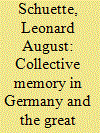|
|
|
Sort Order |
|
|
|
Items / Page
|
|
|
|
|
|
|
| Srl | Item |
| 1 |
ID:
164358


|
|
|
|
|
| Summary/Abstract |
Embedded within the wider normalization–continuity debate about the nature of Germany’s actorness, this article assesses the impact of collective memory on German foreign policy during the European refugee crisis. The Federal Republic’s open-door policy in autumn 2015 bewildered many observers who saw it as a self-harming act of charity. Based on a three-stage empirical framework, the article argues that Germany’s initial behaviour cannot be understood without accounting for the influence that collective memory still exerts in Germany today. The open-door policy was irreconcilable with Germany’s immediate material interests, but instead shaped by collective memory-inspired humanitarian and European principles. This conclusion challenges the growing consensus among students of German foreign policy that Germany is becoming a normal actor which has freed itself from the constraints of the past and behaves in congruence with its material interests. This article seeks to make a timely contribution to the knowledge about collective memory in international relations, Germany’s foreign policy in the specific as well as wider context, and the dynamics of the European refugee crisis.
|
|
|
|
|
|
|
|
|
|
|
|
|
|
|
|
| 2 |
ID:
164361


|
|
|
|
|
| Summary/Abstract |
Discourse analysis, once the purview of critical theories of international politics, has emerged as a mainstream methodology for understanding international relations. While interest in such perspectives has enriched international relations theory, much about the nature of methods—that is, specific empirical processes for the gathering and analysis of evidence—is left ambiguous in this scholarship. Which texts should discourse analyses focus on? And, more practically, how should those texts be chosen? Building on discussions of case study methodology from both qualitative and interpretive social science, this article contributes to theoretical and empirical projects within discourse theory by suggesting a method for text selection: the random selection of texts. I argue that random selection processes are beneficial for discourse analyses that aim to study broad cultural patterns, such as genealogy. Random selection is not simply a means of choosing texts, but also a more comprehensive logic for thinking about the purpose of texts in discourse analysis.
|
|
|
|
|
|
|
|
|
|
|
|
|
|
|
|
| 3 |
ID:
164357


|
|
|
|
|
| Summary/Abstract |
Through a qualitative analysis of three air disasters from Asia in recent years—MH370, MH17 and QZ8501—this article investigates the puzzle of how aviation disasters open up a sovereign state’s domestic governance and foreign policy to international questioning within an anarchic international system. This enquiry thereby highlights the gaps in the global governance of aviation, particularly in the areas of safety and recovery in the wake of aviation disasters. Three linked literatures demonstrate this dynamic. First, aligned with the ‘emotional turn’ in international relations, we show that the portrayal of air disasters and grieving next of kin in global media highlights the politics of grief and trauma. Second, aviation disasters surface the politics of disaster diplomacy in the guise of ‘security competition by proxy’ in the recovery process. Third, we emphasize that these shortfalls in domestic governance and international cooperation demonstrated by the attention-grabbing spectacle of aviation disasters consequently underscore important knowledge, norms and compliance gaps in global aviation governance. Aviation disasters and their aftermath thus shine an international spotlight on the state’s domestic governance and foreign policies in these three manners.
|
|
|
|
|
|
|
|
|
|
|
|
|
|
|
|
| 4 |
ID:
164359


|
|
|
|
|
| Summary/Abstract |
To what extent does growing trade lessen the probability of inter-state conflict? This paper addresses this question by using the curiously under-studied dyadic relationship between Greece and Turkey. Measuring trade and foreign direct investment (FDI) volumes as well as tourism flows and by use of elite interviews with key actors from both countries, we find that economic relations have become stronger and more diverse over time, non-state actors now featuring prominently in deepening interaction. Such developments, however, fail to translate into conflict resolution at the political level. To account for these findings, we use a New Liberal approach, arguing that this helps us explain both enhanced plurality in bilateral economic exchange and the incompatibility of the two countries' respective conceptions regarding legitimate national borders.
|
|
|
|
|
|
|
|
|
|
|
|
|
|
|
|
| 5 |
ID:
164360


|
|
|
|
|
| Summary/Abstract |
Examining Kazakhstan’s foreign policy through the lens of its position as the largest landlocked, and transcontinental, country in the world, the paper presents a multidimensional analysis of the unique soft power strategy adopted recently by this nation in promoting its various international initiatives in its region. In doing so, the paper attempts to understand the implications of Kazakhstan’s distinctive geopolitical setting at the heart of Eurasia for regional integration and security-building initiatives that have been proposed and actively supported by this emerging nation. The paper focuses on investigating key political and socioeconomic aspects of the country’s location at the intersection of Europe and Asia and analyses whether a symbiotic relationship exists between Kazakhstan’s multi-vectored foreign policy and the wide range of its international initiatives aiming to promote economic development, partnership and peaceful coexistence between various nations in the region. The key findings and generalizations of the research will facilitate better understanding of the implications of landlocked geography for the direction of foreign policy, using concrete examples and manifestations of political decisions made in the area.
|
|
|
|
|
|
|
|
|
|
|
|
|
|
|
|
|
|
|
|
|